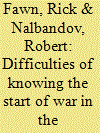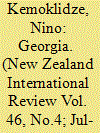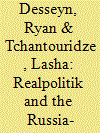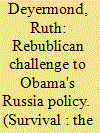|
|
|
Sort Order |
|
|
|
Items / Page
|
|
|
|
|
|
|
| Srl | Item |
| 1 |
ID:
111138


|
|
|
|
|
| Publication |
2012.
|
| Summary/Abstract |
The August War in 2008 generated incompatible accounts of the events causing its outbreak. Through an analysis of Russian language, Georgian language and major English print media, web and television sources, this article provides analysis of the empirical obstacles to objective knowledge; determines what we know, and what remains unknown, and demonstrating what is contested. It then shows the difficulties of being certain of the causes of war, the divergent terms and justifications used, and contends that the start of the war should not be treated as a single event. Rather, the start of the conflict must be understood in terms of an interlinking cycle of events.
|
|
|
|
|
|
|
|
|
|
|
|
|
|
|
|
| 2 |
ID:
179200


|
|
|
|
|
| Summary/Abstract |
Georgia suffered significant violence during and following the demise of the Soviet Union at the end of 1991. It left Abkhazia and South Ossetia outside the control of the republic, and in 2008, following the Russia-Georgia War, Russia recognised them as independent states, a status acknowledged only by a handful of other states. The Kremlin proclaimed the right of self-determination and secession, but the situation is not straightforward because Georgia has traditionally been multi-ethnic. People have lived side-by side relatively peacefully in Abkhazia and South Ossetia for centuries. The de facto secession poses many dangers of ethnic strife for the future.
|
|
|
|
|
|
|
|
|
|
|
|
|
|
|
|
| 3 |
ID:
127580


|
|
|
|
|
| Publication |
2012.
|
| Summary/Abstract |
In November 2011, in a dramatic departure from the original claims of the Russian troops rescuing the inhabitants of Abkhazia and South Ossetia from Tbilisi's genocidal actions, Russian president Dmitry Medvedev acknowledged the real reason behind the Russian invasion of Georgia in August 2008. Speaking on 21 November, 2011 at the headquarters of Russia's 58th army of its Southern Military District located in Vladikavkaz, the capital of North Ossetia, Medvedev noted: "If we had faltered in [August] 2008, geopolitical arrangement would be different now and number of countries in respect of which attempts were made to artificially drag them into the North Atlantic Alliance, would have probably been there [in NATO] now."
This was no slip-up, as Medvedev continued to push this line later on the same day. When interviewed in Rostov on the same day, he further confirmed: "Today I already spoke with the army officers and I will tell it to you too that it was of course a very difficult page in our recent history, but, unfortunately, it was absolutely necessary [decision]. And the fact that Russia's actions at the time were so tough has eventually secured a situation for us, which, despite of all the difficulties, is now quieter than it was…
|
|
|
|
|
|
|
|
|
|
|
|
|
|
|
|
| 4 |
ID:
115190


|
|
|
|
|
| Publication |
2012.
|
| Summary/Abstract |
In the two decades since the collapse of the Soviet Union, relations between the United States and Russia have oscillated between optimism and mutual suspicion. The second administration of George W. Bush (2005-09) is widely acknowledged as the lowest point in post-Cold War bilateral relations, with conflict over a range of prominent and sensitive issues such as missile defence, NATO enlargement, the practice and promotion of democracy, and the August 2008 Russia-Georgia War. In the last years of this period, the question of whether this represented the start of a 'new Cold War' was widely discussed.
|
|
|
|
|
|
|
|
|
|
|
|
|
|
|
|
|
|
|
|
|